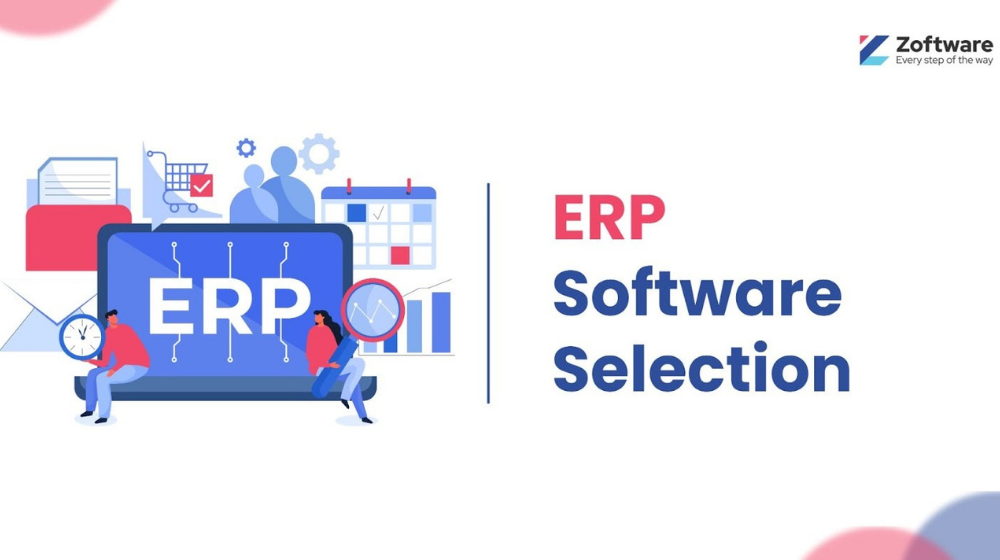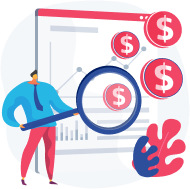Despite the challenges, with 61.1% of ERP projects taking longer than expected to implement and 74.1% exceeding their budget, ERP software implementation remains crucial in today’s business environment. ERP benefits businesses in many ways. ERP Software centralizes and streamlines various business processes, offering significant benefits like enhanced efficiency, improved data accuracy, and better decision-making capabilities.
So, in this blog, you will understand how to choose the right ERP Software. But to fully understand and utilize ERP Software, one must realize ERP Software and its core functionalities.
Let’s get started with the guide.
How to choose the right ERP Software
Understanding Business Requirements
- In-Depth Process Analysis: The first Erp selection criteria is thoroughly analyzing your existing business processes. This deep dive should cover all critical operational areas, including inventory management, accounting, human resources, customer relations, and any other sector relevant to your business.
The aim is to create a comprehensive map of your current operations, pinpointing areas where efficiency could be improved, data management could be streamlined, or reporting could be enhanced. This detailed understanding of your processes is crucial for identifying the specific requirements your ERP Software must fulfill.
- Identify Specific Needs: It’s essential to recognize the unique needs of your business. For example, if your company has a complex inventory system with multiple warehouses, you’ll need an ERP Software that excels in inventory management and logistics. If your business spans multiple countries, look for features like multi-currency and multi-language support. By identifying these specific needs, you ensure that your ERP system options will bring tangible improvements to your business operations.
Setting Clear Objectives
- Goal Alignment: Once you understand your business processes, the ERP selection criteria is to define clear, concrete objectives for what you want the ERP Software to achieve. These goals should align with your broader business strategy. Whether it’s to streamline operations, enhance data accuracy, improve customer satisfaction, reduce operational costs, or all of the above, having well-defined objectives helps select an ERP software to realize these goals.
- Measurable Targets: It’s crucial to set quantifiable objectives. For instance, if one of your goals is to improve efficiency, determine how you will measure this improvement. Will it be in terms of time saved on specific processes, reduced errors, or increased output? Setting measurable targets enables you to evaluate the success of the ERP software post-implementation and ensures that the system delivers real business value.
Budget Consideration
When selecting an ERP software, conducting a comprehensive cost analysis is an essential ERP Selection criterion. This involves the upfront investment in software acquisition and the long-term operational costs. Here are vital factors to consider:
- Initial Costs: These include the purchase price of the software, hardware expenses if new infrastructure is needed, and the cost of system customization to fit your business needs.
- Implementation Costs: This covers the expenses associated with setting up the ERP software, which may involve data migration, system integration, and initial training sessions for your staff.
- Operational Costs: Ongoing expenses include licensing fees, maintenance costs, and additional training for new users or updates. It’s important to factor in these recurrent costs when calculating the total cost of ownership.
- Return on Investment (ROI): Assess the potential financial benefits the ERP software will bring against its costs. Sound ERP software should streamline operations, improve efficiency, and potentially reduce costs in the long term, contributing positively to your ROI.
- Budget Allocation: Ensure that your investment in ERP software aligns with your overall business budget and financial planning. Avoid overspending on features you don’t need, but also be wary of under-investing in critical functionalities.
Features and Functionality
The features and functionality of an ERP system are crucial in determining its suitability for your business needs. Consider the following:
- Essential Features: Identify the non-negotiable features your ERP software must have. These are typically based on your core business processes, such as inventory management, accounting, HR, and CRM.
- Industry-Specific Capabilities: Some ERP software offers specialized functionalities tailored to specific industries. If your business operates in a niche sector, look for systems that cater to your unique requirements.
- Customization and Flexibility: Evaluate how customizable the ERP software is. While a standard solution might meet most needs, the ability to tailor certain aspects can be crucial for fitting your specific business processes.
- User Experience: The system should be user-friendly and intuitive. A complicated interface can lead to a steep learning curve and resistance from staff, affecting productivity.
- Integration with Existing Systems: The ERP software must integrate well with your current software to ensure smooth, uninterrupted workflows.
- Scalability: Ensure that the ERP system can scale with your business growth. It should handle increased transactions and additional users without significant performance issues.
Scalability and Flexibility
- Scalability: The ERP software you choose must be capable of growing with your business. As your company expands, the system should handle increased workloads, more users, and additional data without performance lags. It’s essential that the ERP can be enlarged or upgraded to accommodate business growth, such as expanding into new markets, increasing product lines, or processing a higher volume of transactions.
- Flexibility: Flexibility in ERP software refers to its ability to adapt to your evolving business needs. Your ERP should seamlessly integrate with new technologies and adapt to changes in business processes. This could mean adding new functionalities, customizing features to align with changing business strategies or modifying the system to comply with new regulations.
A flexible ERP software reduces the need for expensive, time-consuming customizations, ensuring your business processes remain efficient and aligned with your strategic objectives.
Vendor Reputation and Support
- Vendor Reputation: The reputation of the ERP vendor is a critical consideration. A vendor with a strong reputation typically offers a more reliable and tested product. Investigate the vendor’s history, including their tenure in the industry, financial stability, and track record with similar-sized businesses or industries. Customer testimonials, case studies, and independent reviews can provide valuable insights into the vendor’s reliability and the performance of their ERP system.
- Support Services: The level and quality of support services the vendor offers are vital for the successful implementation and operation of the ERP system. Look for vendors that provide comprehensive support.
User-Friendly Interface
The interface of your chosen ERP software plays a critical role in its adoption and effectiveness within your organization. A user-friendly interface ensures that employees across different departments can easily navigate and utilize the system, minimizing resistance and the need for extensive training.
- Intuitive Design: Look for an ERP system with an intuitive design that mirrors familiar user experiences. This can significantly reduce the learning curve and help staff to adapt quickly.
- Customization Options: The ability to customize dashboards and workflows to match the specific needs and preferences of different user groups within your organization is crucial. This personalization can enhance productivity and user satisfaction.
- Accessibility: Consider the accessibility of the ERP system, ensuring it is usable for all employees, including those with disabilities. Features like screen readability, voice commands, and adjustable interfaces can make a significant difference.
- Mobile Compatibility: In today’s mobile-centric world, having an ERP system accessible on mobile devices is essential. This enhances flexibility and allows employees to access vital information and perform tasks on the go.
Integration Capabilities
The ERP system’s ability to integrate with your existing software and tools is essential for a smooth transition and maximizing its benefits.
- Compatibility with Current Systems: Ensure the ERP software seamlessly integrates with your current systems, such as CRM, HRMS, or supply chain management tools. This integration is crucial for maintaining data consistency and workflow continuity.
- APIs and Custom Integrations: Look for an ERP system that offers robust APIs (Application Programming Interfaces) and supports custom integrations. This flexibility is critical for tailoring the system to your unique business processes and for future scalability.
- Data Transfer and Synchronization: The ERP should facilitate easy data transfer and synchronization, ensuring real-time data accuracy and availability across all integrated systems.
- Vendor Support for Integration: Consider the ERP vendor’s level of support. Good vendor support can significantly simplify integrating the ERP system with your existing infrastructure.
Conduct a Pilot Test
Implementing an ERP system is a significant investment in both time and resources. A pilot test is an integral part of the selection process. It involves testing the ERP software in a controlled environment to validate its functionality and fit within your business context.
- User Feedback: This stage is crucial for gathering feedback from end-users interacting with the system daily. Their insights can highlight usability issues and potential improvements.
- Training and Adaptation: The pilot phase also serves as a training period, helping users get accustomed to the new system. This early exposure can ease the transition post-implementation.
- Validation of Expectations: A pilot test verifies that the ERP meets the earlier objectives and requirements. It’s a practical test to see if the system delivers the promised efficiency gains and functionality enhancements.
Conclusion
With many ERP systems in the market, choosing the most suitable one can take time and effort. To simplify this process, Zoftware emerges as an ideal partner for your ERP software search.
Positioned in the Middle East, Zoftware serves as a software discovery platform. It specializes in assisting businesses to navigate through the complexities of selecting ERP software. By helping organizations define their specific needs and contrasting various software options, Zoftware paves the way for more informed decision-making.
Register today at Zoftware to discover the ideal software solution for your business.

